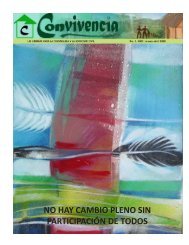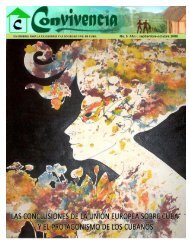Untitled - Convivencia
Untitled - Convivencia
Untitled - Convivencia
You also want an ePaper? Increase the reach of your titles
YUMPU automatically turns print PDFs into web optimized ePapers that Google loves.
The necessary laicism of the State and theright to religious freedom of all Cubans, menand women, should not be an uncivil pretextto erase in one go, the history of this Islandwhich is overlapped, whether we want it ornot, with the Church that came from Spainand got mixed with the African and theprotestant Churches and made up themiscellaneous fabric of the national “ajiaco”(2). Better than erase we should rescue thememory of these paths of the Nation’s soul.If we are forgetful of everything related tothe values of the spirit and if we replacethem with secularist complexes, ideologicalmessianisms or denominational taboos, thespirit of the peoples dry out and also theyare submitted to the most spurious idols andslaveries. Once more, Dulce María Loynazhad said it in a poetic way: “if we don’t useour soul as a root, we dry out”. That’s why Iconsider that this part of the words said byMonsignor Meurice should not be obviatedor left only for Catholics. Cuba’s matrix, forbeing Catholic, which means “universal” isand should be a uterus without exclusions.Monsignor Pedro el Claro said this: “HolyFather, we present you the glorious epoch ofFather Varela from the San Carlos Seminar inHavana and from the San Antonio MaríaClaret Seminar in Santiago, but also the darkyears in which, due to the chaos of thecouncil, the Church was decimated at thebeginning of the 19 th century (…), it wentthrough the threshold of this century tryingto recover itself until in the 50’s it found itsmaximum splendour and cubanhood (…)Later, as a result of the ideologicalconfrontation with Marxism-Leninism whichwas induced by the State it was impoverishedagain: poor means and a few pastoralagents; but the Church was not poorregarding the motions of the spirit, forexample: the National Ecclesial CubanEncounter (…) It was a Church in a stage ofreal growing and a long-suffering credibilitywhich arises from the experienced andshared cross. Perhaps some persons mightmistake this religious awakening for a cult ofpietism or for a fake inner peace thatescapes from commitment”.8. Cuba must build its present and itsfuture counting on the whole nation: theone that lives in the Island and the onefrom the Diaspora.Sister Mirtha, a nun who accompaniedMonsignor Meurice during his whole episcopateand the last moments of his life on earth, tellsthat his last words were: “Don’t split up! Don’tsplit up! Don’t split up! It’s the plea of the goodpastor who takes care of the communion of hispeople until his last breath. An interpretation ofthis triple plea could be: don’t split up as aChurch; don’t split up as a people; don’t beaway from God, from the good, from the truethings. The necessities of communion could beothers: unity in diversity, not in uniformity. Tosail striding and slowing down through thehistory of one people means to plough througha day’s run of accompanied fleet; of fleetwithout sides though they might be of diversepassages or merchants. It’s to overcome theage of exclusive ships, violent pirates or armiesresisting the temptation to dismember, toexclude or separate the ones who are not, don’tthink, don’t believe or don’t act as one of theparties. It’s to build a ship-country “with roomfor everyone” as Martí said. Under the mantle ofthe virgin that is called “Caridad” in Cuba, thestrongest link of communion, Meurice who wasa good captain of the ship of Jesus, traced thisroute through the turbulent Caribbean Sea: “thenation lives here and lives in the Diaspora. TheCuban man suffers lives and waits here andalso suffers lives and waits out there. We areonly one people that is sailing in strides over allthe seas, we continue seeking unity which willnever be the result of uniformity but the resultof a common and shared soul based ondiversity”.9. Cuba must identify what its major povertyis and work in order to be out of it: the lackof freedom.Amartya Sen is a recognized Hindu economistwho has made a contribution to humanity: thedemonstration of a social scientist about thereciprocal relation between personal freedomand the development of peoples. We Cubans,men and women, know by the experiencebacked up with every day life, that no reformor updating of any economic, political or socialsystem will result in the development of thenation if we don’t recognize legally, promote insociety and educate consciously that thefreedom of the human person is the base, thefoundation and the driving force of everyprogress. Without freedom there is noresponsibility and without responsibility thereEdiciones <strong>Convivencia</strong>Pinar del Río. 201291





